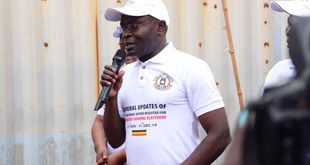
Kampala, Uganda | THE INDEPENDENT | An ongoing tax dispute between the Ugandan government and Tullow Oil has led to the postponement of the planned Final Investment Decision for the Albertine oil development project to the second half of 2019.
The capital gains tax dispute from Tullow’s farm-down of its stake in the project was expected to have been resolved by the end of April, for joint venture partners Total, S.A., Chinese firm China National Offshore Oil Corporation (CNOOC), and UK firm Tullow to take a final investment decision within the first half of 2019.
The final investment decision (FID) was expected to open the tap for money to start flowing, paving the way for projects like the US$3.5bn East Africa Crude Oil Pipeline.
Instead, construction of the 1400 km heated oil export pipeline from Hoima in western Uganda to Tanzania’s port of Tanga on Indian Ocean has stalled.
Tullow Oil Chief Executive Chief Officer, Paul McDade, in a trading statement on April 25, said “Uganda FID is now planned for the second half of 2019, farm-down approval being finalized with government of Uganda.” He did not say why discussions about the farm-down have taken longer than expected, but he said they are expected to be concluded soon.
The Dispute
In January 2017 Tullow signed a purchase agreement with Total, agreeing to transfer 21.57% of its 33.33% interests in Exploration Areas 1, 1A and 2 in the Lake Albert Development project at $900 million (Shs3.2 trillion).
Tullow was expected to receive $200 million (Shs720 billion) in cash—consisting of $100 million on completion of the transaction and $50 million at both Final Investment Decision and first oil. The balance of $700 million (Shs2.5 trillion) in deferred consideration will fund Tullow’s share of the development and pipeline costs.
In February 2017, CNOOC Uganda exercised its pre-emption rights to acquire 50% of the interests being transferred to Total.
Tullow in September 2017 notified the government about the farm-down to Total and CNOOC. The government agreed to the farm-down but slapped on Tullow a $167m( (Shs600b) capital gains tax, leading to the new tax dispute.
Tullow said it was not liable to capital gains tax because it was transferring shares to another investor for reinvestment in the project. Uganda Revenue Authority and government technocrats insist that Tullow must pay the capital gains tax.
Ending the Standoff
In mid-January 2019, President Museveni met chief executives of the oil companies in an effort to end the standoff. In a meeting with Total chairman Patrick Pouyanne, Museveni reached an amicable agreement, and Pouyanne reportedly agreed to pay $82m (Shs302b), out of the $167 million (Shs600b) tax as a loan to Tullow. Tullow Oil Plc, Tullow Uganda Pty’s parent company chief executive officer Paul McDade also met the president around the same time.
They reportedly agreed to the principals on how the tax in dispute would be cleared, seemingly unlocking the standoff. After the meeting, McDade indicated that Tullow would settle the tax payments to Uganda’s treasury in phases with a final figure partly tied to the oil field project’s progress. But the issue still seems to be unresolved even among the joint venture partners.
One of the sticky points holding the finalization of the final approval of the farm-down deal is that the government insists that Tullow should be given $167 million invoice. But Tullow insists that it should be given an invoice of $85 million since Total agreed to pay $82 million. Tullow also reportedly asked to pay the $85m (Shs316b) million in installments.
Energy Minister Irene Muloni said the $167m (Shs600b) tax was computed by Uganda Revenue Authority and that the government’s position is that it has to be paid.
“For me as a licensee I gave conditional consent to this transaction subject to the tax obligation as assessed by Uganda Revenue Authority” said Muloni.
But a lawyer close to Tullow’s negotiations told URN on condition of anonymity that the farm-down shouldn’t have been taxed.
“The government of Uganda is asking for $167 million but I think it was wrong for the government to tax that transaction. If someone takes over my obligation, why should you tax me?” he said in an interview.
Paul Bagabo, a consultant with Natural Resources Governance Institute (NRGI) disagrees that Tullow should have been left to go without paying capital gains tax.
“You see people are not geting down to the principals. A sale is a sale. If make capital gains from shares in private company, the law is clear that it should be subject to capital gains tax” he said.
Bagabo said the current standoff can be resolved by establishing whether there was a gain on the sale, and whether the value of shares appreciated in value as per the income tax of Uganda.
“It shouldn’t just be based on negotiations,” Bugaboo added. “If Tullow is disputing, then let’s task experts to carry out an assessment. Chances are that we may have asked for less or more from Tullow.”
 The Independent Uganda: You get the Truth we Pay the Price
The Independent Uganda: You get the Truth we Pay the Price


